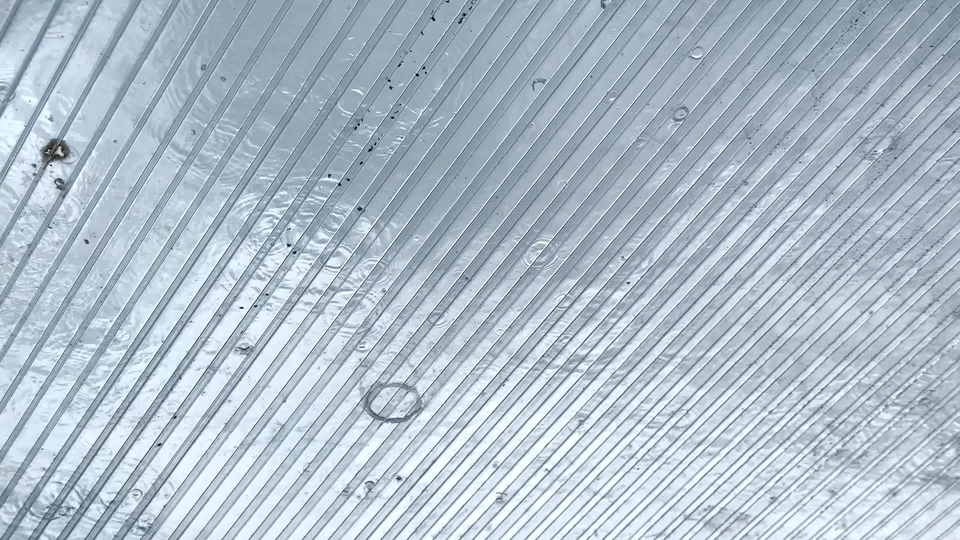The Philippines is expected to enter its rainy season in June, and will extend until September to October this 2025. Characterized with heavier rainfails, strong winds and expected typhoons, it is highly recommended to prepare your home and your roof, to avoid leaks, and minimize the possible damages that the rainy season may bring to your properties. Although the dry and humid weather is still set upon us this May, it is never too early to prepare for what’s ahead. After all, the best time to prepare is before and never during the calamity.
Polycarbonate’s Performance during Typhoons
Polycarbonate roofs just like most roofs are subjected to the stress and resistance against tropical typhoons. And just like most roofs, the durability of polycarbonate is evaluated on 2 factors: wind resistance and impact resistance. Polycarbonate is 250 times stronger than glass, flexible under stress and durable enough to withstand heavy impact. In extreme cases where damage to the polycarbonate roof is inevitable, then you need not to worry about this plastic material. Unlike glass, it will not break and shatter into tiny, dangerous pieces – cutting the risk of you, or any in the family, being wounded by a sharp broken piece of glass. Do not be fooled by its lightweight property, as it can retain the same amount of strength like any roofing material does.
Waterproofing your Polycarbonate Roof
1. Proper Care starts with the Right Installation.
The complexity of the installation varies depending on the type of polycarbonate you choose. Twinwall polycarbonate is particularly more intricate to install, as it needs accessories to seal both ends. Sealing the ends will keep the water from seeping inside, which, once dried and unable to be released, will stain and ruin the look of the sheet, further damaging its integrity. For best results, twinwall is installed with blanking tape at the top and a breather tape at the bottom end of the sheet. This way, you can not only keep the water from entering the holes, it will also keep dirt and insects from passing through and allow air to move through freely. Unlike twinwall, solid polycarbonate does not employ the use of such sealing materials. However, like twinwall, and other types of polycarbonate, it needs to have a proper framing support and sealants, to prevent water from entering the structure through the screws, or any open ends. Moreover, it is important to use the appropriate clamps and clips to secure the sheets together. Another installation consideration is the slope of the roof. A sloped roof allows the water to flow down naturally down the drainage, prevent water pooling, and naturally cleans the dirt, leaves, and other debris on its surface. Try to observe the polycarbonate roofs you see. Even flat roofs require a minimum slope to perform its function well. Ask your local polycarbonate supplier to know the minimum required slope for your polycarbonate roof.
2. Maintenance and Care takes half the work.
Maintenance and roof inspection helps you scout the problems ahead of the incoming bad weather. Are there holes or leaks in the roof? Does the roof need to be repaired or replaced? These are some questions that you are expected to answer once you inspect your roof. Any visible signs of wear and tear can tell you if the roof will still have its optimum performance for years to come. In skylight roofing, the minor problems can include scratches or discoloration on the sheet, mold and algae growth, and leaks because of damaged flashing, seal failure, or poor installation. Addressing these “small” concerns promptly will prevent them from being bigger problems later on.
The main purpose of waterproofing is to keep water from penetrating your home, which leads to building deterioration and dangerous conditions, and may also have health repercussions. In waterproofing, always remember that professional workmanship and having a durable material are equally important. Polycarbonate is a trusted reliable material for contractors, architects, and homeowners alike. With durable and weather resistant properties, you are guaranteed the protection and care that you need. For more details regarding polycarbonate sheet price Philippines, you may reach us through the following contact details:
Get a quote: https://forms.gle/KzzS3tb7UgV9Y6ng7
Send us a message: sales@polylite.com.ph
Contact us: (02) 8808-7659; 0998 979 7659 / 0998 961 7502

